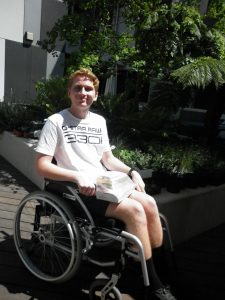Tom's Journey

In 2016, 18-year-old Tom Spratt was driving to Newcastle to attend university when he fell asleep at the wheel and was hit by a passing motorist. Tom woke in hospital to find he had sustained a traumatic brain injury.
“I had to learn to walk, talk, eat and laugh again. I’ve seen videos of myself, and I was looking into space. I had no idea what was going on,” said Tom.
After over six months in rehabilitation Tom was discharged to find himself homeless, before a social worker helped him find social disability housing.
A fun, outgoing and driven guy, Tom, now 26-year-old, has transformed his life and goals to focus on helping others. He said, “I use the experience as a valuable lesson, it has set me on a different and much harder path that I persevere with on the daily.”
“In many ways I am grateful for the experience. It’s left me with new goals. My ultimate goal is to be an Occupational Therapist (OT).”
“It will take me 5-10 years to become an OT. I work part-time as a support worker. I drive people around, cook for them and support them.
“I’m passionate about health now. I don’t know what the future holds, but I hope I can take my business forward as an OT once I’m finished studying.”
“After getting brain injury from a near death experience, I can really appreciate the wonder of my life now. I can feel grateful for that. I don’t put myself in as riskier situations now as I did then. As we all do in our teens. Now I’m more focused on looking after myself, maybe that’s just maturity. I’m thriving.”
Tom moved out of social disability housing and now owns his own home, after plenty of saving pre- and post-accident.
“I have had plenty of contact with people who are all ‘poor me’. And they are totally looking at it the wrong way, because if we look at it that way it’s negative reinforcement. It’s best to be positive. In recent times I’ve had more of a realisation that positivity will only get me so far, so now I must put it into action.”
“The most noticeable symptom for me now is memory. I can read over things 20 thousand time and struggle to remember. I write things down in my phone, I take notes of my clients. How it felt so I can remember. Memory assistance, I use different senses in different ways to remember but that is the difficult part of brain injury.
“I try and use my senses to remember things. I do that for anything I’m trying to remember. Explaining things to people to help me remember the information from my studies.
“This degree is tough; any study can be difficult. It’s my dream and I want to work towards it. I can’t see myself in anything else than OT.”